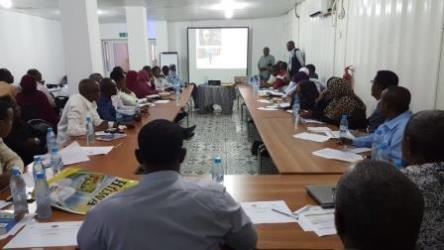 Somali health workers attending cholera response training4 September 2016 – Many front line health personnel currently working in cholera-affected districts in Somalia lack the essential knowledge and skills to manage cholera outbreaks. In response to this, the Federal Ministry of Health of Somalia requested technical support in strengthening the human capacity to support the preparedness and response to the ongoing cholera outbreaks. Building the capacity of front line health workers in cholera preparedness and response interventions can save lives and contribute to overall strategies to prevent or contain the spread of cholera infections.
Somali health workers attending cholera response training4 September 2016 – Many front line health personnel currently working in cholera-affected districts in Somalia lack the essential knowledge and skills to manage cholera outbreaks. In response to this, the Federal Ministry of Health of Somalia requested technical support in strengthening the human capacity to support the preparedness and response to the ongoing cholera outbreaks. Building the capacity of front line health workers in cholera preparedness and response interventions can save lives and contribute to overall strategies to prevent or contain the spread of cholera infections.
World Health Organization (WHO), together with the Federal Ministry of Health of Somalia and UNICEF, conducted a five-day training of master trainers between 16 and 22 August 2016 in Mogadishu for 56 health workers in cholera case management, surveillance, water and sanitation. The participants consisted of clinicians, surveillance officers, laboratory technicians, community mobilizers and regional medical officers working in cholera-affected districts in nine regions located in the south and central parts of the country.
Somalia has experienced protracted humanitarian complex emergencies in the last 26 years compounded by a recurring conflict, flooding, drought and disease epidemics. The situation is worsened by the El Niño phenomenon that has exacerbated health risks associated with extreme weather in different regions of the country. Unusual flooding has triggered major outbreaks of cholera that have affected all regions in south and central Somalia.
The cholera outbreak has spread to 25 districts in nine regions of Somalia with more than 13 400 suspected cholera cases including 496 deaths (CFR 3.7%) reported in the first eight months of 2016. Compared with the 2929 cases reported in the same period in 2015, the number of cases reported from Somalia has increased four-fold. The El Niño event, increased population movement, deteriorating water and sanitation conditions, malnutrition and other factors have contributed to the observed increase of cholera cases and deaths.
With increased knowledge and skills among front line health care workers, cholera patients will receive better care from trained professionals. This will eventually reduce the mortality rate attributed to cholera and reduce the spread of cholera within and outside health facilities.
The trained health workers were equipped with additional knowledge and skills on how to effectively implement proven intervention methods so as to prevent or control cholera epidemics, including early warning surveillance, laboratory confirmation, proper sanitation and hygiene practices, and use of oral cholera vaccine, among others.
WHO is working closely with the Federal Ministry of Health and other state health authorities to respond to the ongoing cholera outbreaks, as well as other health problems in the country, through technical and financial support. A series of cascade training sessions on cholera preparedness and response in high-risk regions will be supported by WHO in the coming weeks. The trained master trainers, together with WHO and UNICEF technical teams, will co-facilitate the planned regional or district cholera training.
Furthermore, the Federal Ministry of Health has endorsed the introduction of oral cholera vaccine in three hotspot districts, while WHO will provide the required technical support and raise funds to finance the cholera vaccination campaigns in the selected sites.
Other cholera activities supported by WHO include the development of the first e-cholera preparedness and response plan for Somalia, which will be finalized by early September 2016.






